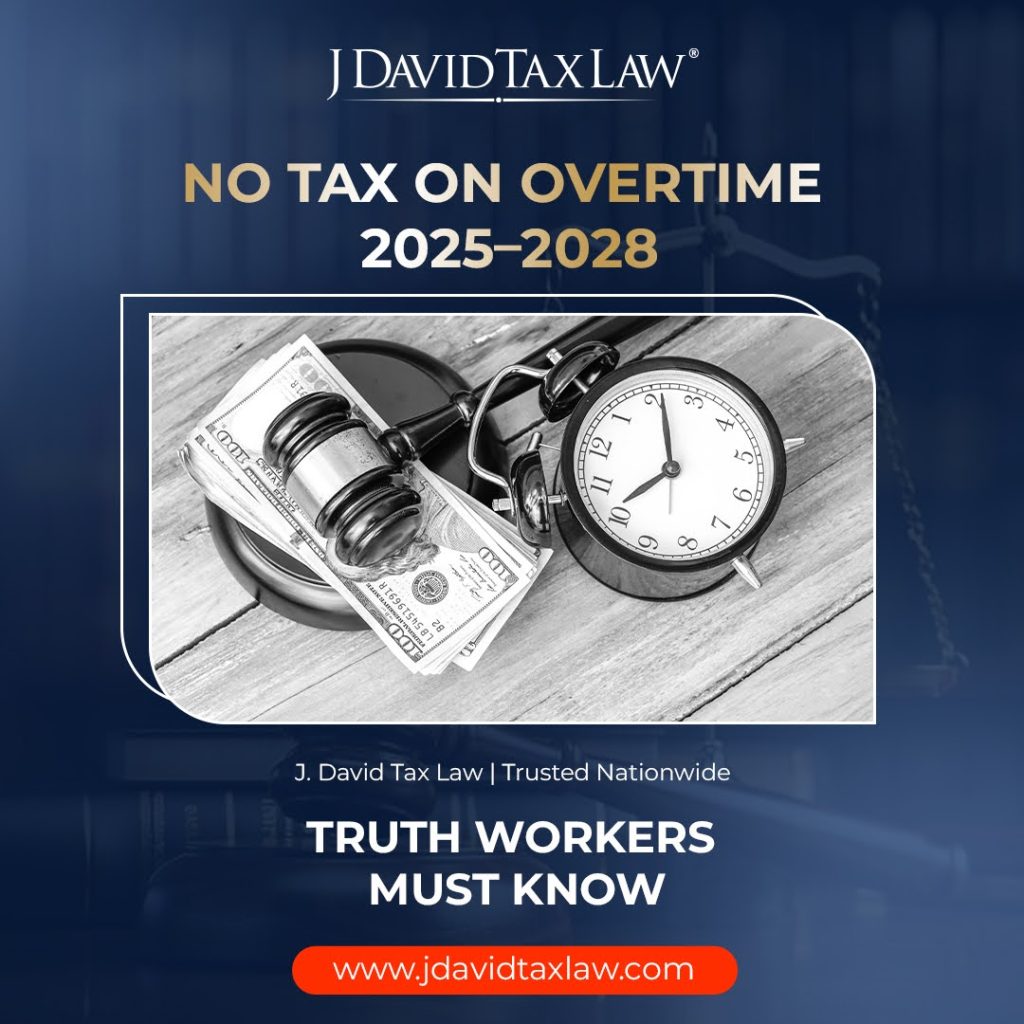Overtime isn’t just extra hours, it represents billions in wages the IRS tracks closely. In 2023, private-sector employees averaged 34.2 hours per week, signaling a large portion of the workforce routinely earning overtime pay. Recent headlines about “no tax on overtime” suggest those earnings are now shielded from taxation, but the reality is far narrower.
The One Big Beautiful Bill introduced this change as a limited deduction with strict caps and timelines. Misunderstanding those details can leave workers exposed to IRS debt, penalties, and wage garnishments — outcomes J. David Tax Law is prepared to defend against.
Key Takeaways
- The “no tax on overtime” rule is part of the One Big Beautiful Bill (often tied to the Trump tax plan).
- It does not make overtime wages tax-free — only the premium portion qualifies for a deduction.
- Deduction caps: $12,500 (single) / $25,000 (married filing jointly) with phase-outs starting at $150K / $300K.
- The law is retroactive to January 1, 2025 and applies through 2028.
- Workers will still pay Social Security and Medicare taxes on overtime.
Misunderstanding the law may result in unexpected IRS debt, audits, or wage garnishments.
What Is the No Tax on Overtime Bill?
The No Tax on Overtime Bill, passed as part of the One Big Beautiful Bill (OBBBA) and signed into law in July 2025, reshaped how overtime wages are treated for tax purposes. Despite its name, the law does not eliminate taxes on overtime. Instead, it creates a temporary federal income tax deduction for the premium portion of overtime pay — the additional “half-time” earned above a worker’s regular hourly wage.
Regular wages, even if earned through overtime hours, remain fully taxable. This distinction matters, because many headlines suggest overtime is now tax-free when in reality, the benefit is limited, capped, and temporary. Workers who don’t understand these limits could end up owing more than they expect — and the IRS will enforce those balances.
When Does No Tax on Overtime Start?
Although the law was enacted in July 2025, it is retroactive to January 1, 2025 and will remain in effect through December 31, 2028. This means that any qualifying overtime pay earned in 2025 is eligible for the deduction, even if it was earned before the law was signed.
Workers should also understand that paychecks will not immediately change in 2025. Employers will continue withholding federal taxes on overtime wages as usual. The deduction is claimed later — when filing your 2025 tax return in 2026.
This delay has already created confusion. Many employees expect to see “no tax on overtime” reflected in their take-home pay, but instead see normal withholdings on their stubs. Without proper planning, that misunderstanding can turn into unexpected balances due to the IRS, a risk J. David Tax Law is prepared to handle when collection actions begin.
How Much Overtime Income Is Tax-Free?
The law sets strict limits on how much overtime pay can qualify for the deduction. For the 2025 tax year and beyond, the caps are:
- $12,500 for single filers
- $25,000 for married couples filing jointly
Anything above these amounts is fully taxable under standard IRS rules. In addition, the benefit begins to phase out for higher earners:
- At $150,000 of modified adjusted gross income (MAGI) for individuals
- At $300,000 MAGI for joint filers
It’s important to emphasize that this is not a blanket exemption. Only the premium portion of overtime wages — the extra half-time added to base pay — qualifies for the deduction. Social Security and Medicare taxes still apply to all overtime earnings.
Pro Tip: Track Overtime Separately
Keep a record of your overtime premium pay apart from base wages. This makes filing smoother and helps if the IRS questions your deduction.
Who Qualifies for No Tax on Overtime?
Eligibility for the overtime deduction is limited, and not every worker will benefit. The law applies primarily to:
- Hourly, non-exempt employees covered under the Fair Labor Standards Act (FLSA) who are entitled to overtime pay.
- Workers whose overtime qualifies under the definition of premium pay — the extra half-time above base wages.
Overtime isn’t the only area where tax rules are misunderstood. Many workers also believe tips are tax-free, which can trigger IRS problems just as quickly. Read our full guide on No Tax on Tips
The IRS is Forgiving Millions Each Day. You Could Be Next.
How Will No Tax on Overtime Affect Employees and Employers?
| Employees | Employers |
|---|---|
| Still see regular tax withholdings on overtime pay in 2025; relief only comes at filing. | Must continue withholding taxes on overtime wages despite the new law. |
| May qualify for a deduction (up to $12,500 single / $25,000 married) if within income limits. | Required to report qualifying overtime separately on the W-2 form 2025 and follow new IRS guidance. |
| Risk of misunderstanding the law and underplanning, which can lead to IRS debt, penalties, and wage garnishments. | Face added compliance and record-keeping obligations, including payroll adjustments in later years. |
| Workers in overtime-heavy industries (healthcare, hospitality, trades) are most at risk of surprise tax bills. | Must ensure accurate payroll administration and may need to provide documentation if audited. |
| Relief may improve financial planning if applied correctly, but IRS enforcement is certain if mistakes are made. | Noncompliance or errors can trigger IRS scrutiny and penalties for businesses. |
What Are the Risks Few Are Talking About?
Most articles highlight the promise of “no tax on overtime,” but few explain the reality: mistakes will happen, and the IRS will enforce every dollar. For workers who rely on overtime income, this can mean unexpected balances, penalties, and aggressive collection. Here’s what that looks like, and how our tax attorneys can help.
Surprise Tax Balances
When workers assume overtime is tax-free, they often fail to plan for the actual liability. At filing, many discover they owe far more than expected. For households already stretched thin, this “surprise balance” can feel impossible to pay and becomes the starting point of IRS enforcement.
Pro Tip: Get Ahead of IRS Notices
If you miscalculated and end up with a balance, addressing it early often leads to more flexible IRS repayment options.
How J. David Tax Law Helps
Our tax attorneys step in immediately when a tax balance creates hardship. We negotiate directly with the IRS to set up manageable Installment Agreements or pursue an Offer in Compromise, which can reduce the balance owed for qualifying clients. Rather than facing a lump-sum demand, our clients gain structured relief backed by legal protection.
Penalties and Interest
Once a balance is due, the IRS begins adding penalties and interest almost immediately. A $5,000 balance can grow by thousands more within months, turning a manageable issue into overwhelming debt. Many workers ignore the notices, only to find the debt spiraling out of control.
How J. David Tax Law Helps
We fight for Penalty Abatement to reduce or remove IRS penalties, especially in cases of misunderstanding or financial hardship. By cutting down these added costs, we help clients focus on resolving the core tax debt instead of drowning in compounding interest and fees.
IRS Audits
Overtime deductions add complexity to tax filings, and any errors can trigger an audit. The IRS won’t just review the overtime claim—it can open up your entire return, looking for additional liabilities. Audits are intimidating, time-consuming, and costly if handled alone.
How We Can Help
Our attorneys provide full Audit Representation, dealing directly with the IRS on your behalf. Instead of navigating audit questions, document requests, and deadlines alone, you gain an experienced legal team that knows how to push back and protect your rights.
Wage Garnishments, Liens, and Levies
If a balance remains unpaid, the IRS can move quickly to seize income and assets. Wage garnishments can strip a large portion of each paycheck, liens can lock up property, and bank levies can drain accounts without warning. For workers who depend on overtime to keep up with expenses, this level of enforcement can be devastating.
How We Can Help
We act fast to stop wage garnishments, often within 48 hours, giving you immediate relief. From there, we work to release liens, prevent levies, and secure long-term solutions with the IRS. Our goal is not just to pause enforcement but to protect income permanently through structured resolutions.
Final Takeaway: What Should Workers Do Now?
The promise of “no tax on overtime” has captured attention, but the truth is narrower than headlines suggest. The deduction is limited, temporary, and only applies under strict conditions. Misunderstanding those limits can leave hardworking Americans facing surprise tax bills, penalties, audits, and aggressive IRS collections.
J. David Tax Law is not a tax resolution company. We are a national law firm focused exclusively on defending clients against the IRS. When overtime wages create unexpected balances or enforcement actions, we act fast to:
- Stop wage garnishments, often within 48 hours.
- Negotiate Installment Agreements or Offers in Compromise.
- Pursue penalty relief to reduce unnecessary costs.
- Represent clients directly against the IRS at every stage of collection.
If you believed overtime would be tax-free and now face IRS debt, waiting will only make the problem worse. The sooner you act, the more options you have.
Call J. David Tax Law at (888) 342-9436 today and protect your paycheck before the IRS takes it.
Frequently Asked Questions
Will there be no taxes on overtime?
No, overtime is not completely tax-free. The new law under the One Big Beautiful Bill allows a temporary deduction on the premium portion of overtime from 2025–2028, capped at $12,500 for individuals and $25,000 for couples. All overtime wages are still subject to Social Security and Medicare taxes, and misunderstanding this rule can leave workers owing the IRS.
Is overtime taxed at 40%?
Overtime is not taxed at a flat 40%. Overtime pay is added to your regular income and taxed at your marginal tax rate, which can make it feel like the IRS is “taking more.” The new deduction lowers taxable income slightly, but all overtime is still subject to federal tax and payroll taxes.
Which states do not tax overtime?
Only Alabama has enacted a specific overtime exemption, removing state income tax on overtime wages from January 1, 2024, through June 30, 2025 under Act 2024-437. That program has now expired, and overtime pay is once again taxable in Alabama. In addition, states with no state income tax—including Florida, Texas, Nevada, Washington, South Dakota, Wyoming, Alaska, Tennessee, and New Hampshire—also do not tax overtime wages since all income is untaxed at the state level.
When does no tax on overtime start?
The overtime deduction is retroactive to January 1, 2025 and will remain in effect through December 31, 2028 under the One Big Beautiful Bill. Workers will not see the benefit in their paychecks immediately — it can only be claimed when filing the 2025 tax return in 2026. Misunderstanding this timeline may lead to unexpected IRS balances.
Who qualifies for no tax on overtime?
Eligibility is limited to hourly, non-exempt employees who are entitled to overtime under the Fair Labor Standards Act (FLSA). The deduction phases out above $150,000 MAGI for single filers and $300,000 MAGI for joint filers. Salaried exempt employees and certain union or railway workers are not eligible.



















